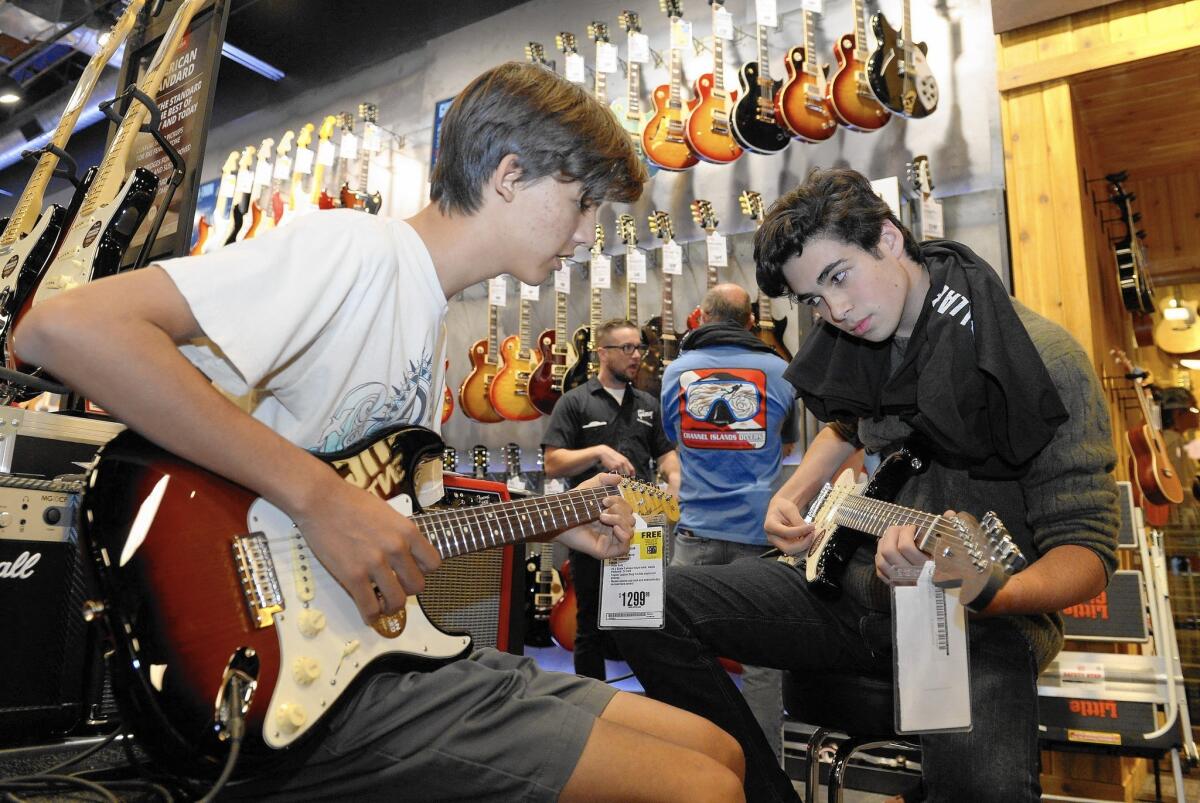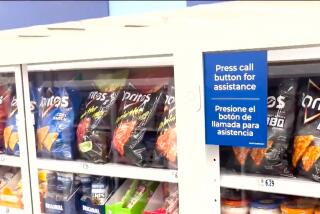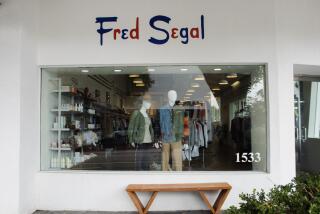Guitar Center overhaul plays up hands-on experience

From left, Jack Woods and Nate Aldin jam during the opening of Guitar Center’s Westlake Village store.
Justin Alvarado perched on a stool, softly strumming an electric guitar and ignoring the teenager who jammed just feet away.
Alvarado, 19, comes to Guitar Center’s Sherman Oaks store every few months to check out the bass guitars as he saves to buy one better than his current pawn-shop special.
“This is where it’s at,” Alvarado said. “I’m always trying stuff out.”
Guitar Center is famous for allowing customers to endlessly fiddle with its products, which these days include synthesizers and strobe lights alongside the traditional guitars and drums. The lure of such product demos is key to the Westlake Village retailer’s recovery efforts after rough years marked by the recession, online competition and the exploding popularity of hip-hop and electronic dance music, more hiply called EDM, which aren’t known for guitar riffs.
New top management is looking to leverage Guitar Center’s 268 stores as its biggest advantage over e-commerce through an extensive store overhaul to emphasize the hands-on experience.
“There’s nothing more impactful than picking up and playing instruments,” said Michael Amkreutz, executive vice president of merchandising, marketing and e-commerce. “There’s not as much emotion involved in other industries.”
The remodeled stores are more open and offer more lesson areas as well as assistance in setting up instruments and equipment, Amkreutz said. Some may incorporate music consulting.
In the past, these kinds of services were farmed out to businesses that popped up near Guitar Center locations, said Frank Alkyer, publisher of Music Inc. By including these in-house, the company is making its stores all-encompassing so that someone who is there for lessons might pick up other products, such as strings.
“There are a lot of people that … think brick and mortar is dead,” he said. “I don’t think it is any more than people who say anything else is dead. It’s not one or the other, it’s all.”
True to its name, Guitar Center still sells more guitars that anything else, about 41% or 42% of overall sales, Amkreutz said. In second place, with 27% or 28% of sales, is what the company calls technology — recording equipment, keyboards, microphones and fog machines.
The store in Sherman Oaks, which was remodeled recently, reflects this shift. The main room’s walls still display towering rows of electric guitars, but the adjoining room is stocked with laser lights and DJ equipment.
Since its humble beginnings as an organ store in Hollywood in 1959, Guitar Center has grown into the world’s largest musical instrument retailer.
Crowds of music fans have flocked to the flagship Sunset Boulevard store and its “Rock Walk” to see famous musicians’ handprints in cement. The private company said it holds an estimated one-third of the $6-billion musical instrument market.
In 1997, the 28-store chain went public and moved nationwide. Professional musicians were drawn to the retailer’s well-stocked shelves and large locations.
“The way they described it was a wow effect,” said Brian Majeski, editor of the Music Trades magazine, an industry publication.
In 2007, Boston-based private equity firm Bain Capital Partners bought Guitar Center for $2.1 billion. The chain operated more than 210 stores at the time, as well as more than 95 Music & Arts stores, which sold and rented band instruments. The retailer also owned Musician’s Friend, which sold instruments both online and through a catalog.
But after almost a decade of steady growth, the music industry stalled in 2008, when the recession hit, and the industry never quite recovered, Majeski said.
Los Angeles financial firm Ares Management took control of Guitar Center in 2014 after agreeing to swap about $500 million in company debt for equity. Darrell Webb, former chief executive of the Sports Authority Inc. and Jo-Ann Fabric & Craft Stores, is now at the helm of Guitar Center.
“We’ve been very focused on ... making sure we maintain the core culture at Guitar Center,” he said. “We want to be as welcoming to the suburban mom as we are to the more traditional rock customer, or an EDM DJ.”
For the first quarter of 2015, earnings increased 40% after some restructuring charges, Webb said. As a private company, Guitar Center doesn’t disclose financial figures.
Credit rating companies like Moody’s Investors Service are cautious. In late April, Moody’s gave the company a subprime B3 rating, but said the outlook was stable.
“The economy hasn’t improved necessarily for products that are highly discretionary,” said Keith Foley, senior vice president of Moody’s.
The company restructured in November to lower debt but is still highly leveraged, he said.
“They’re in better shape,” Foley said. “The first quarter was actually pretty good. But that being said, there’s a big hurdle for them to really get on some strong financial footing.”
To that end, Guitar Center also has beefed up its website and is featuring more women in its commercials as part of an effort to appeal to all buyers at all experience levels. In addition, the retailer is heavily promoting its DirectTV series of musician interviews and live performances called “Guitar Center Sessions.”
“It’s a much more challenging marketing puzzle today than ever before,” said Alkyer of Music Inc. “Those who can find the ways to cut through the clutter are the ones that are going to win.”
Twitter: @smasunaga
More to Read
Inside the business of entertainment
The Wide Shot brings you news, analysis and insights on everything from streaming wars to production — and what it all means for the future.
You may occasionally receive promotional content from the Los Angeles Times.











